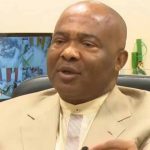The Rector, Federal Polytechnic Ado Ekiti, Ekiti State, Dr. Hephzibah Oladebeye and the Commissioner for Public Utilities in Ekiti, Mr. Bamidele Faparusi have disclosed that the COVID-19 spread has been difficult to tame in Nigeria because about 150 million Nigerians lack access to basic handwashing facilities.
The engineering experts regretted that about 60 million Nigerians also lack access to clean water services, hence, the increasing morbidity and mortality rates, which result in a low life expectancy of the citizens.
They spoke on Tuesday during the 2020 Engineering Week organised by the Nigerian Society of Engineers(NSE), Ekiti chapter in Ado Ekiti.
The programme with the theme: ‘The Role of Adequate Water Supply, Sanitation and Hygiene Infrastructure to Combat the Spread of COVID-19 in Nigeria’, brainstormed on provision of safe water for citizens.
Oladebeye revealed that the geometric spread of the COVID-19 infection was gradually assuming a frightening and disturbing dimension, saying unfettered access to water and other precautionary facilities are necessary to save the citizenry from serious affliction.
“As the coronavirus spread all over the world, it is increasingly clear that people with the least access to essential services like water will feel the traumatic effect.
“Sustainable Development Goals 2019 report in Nigeria revealed that about 60m people lack access to clean water supply and 150m lack basic handwashing facilities with soap and water.
“From the foregoing, stakeholders must recognise and be committed to prioritizing access to clean water and decent toilets as basic human rights and must ensure provision of these services at this most critical time when they have been proven to be crucial in fighting COVID-19”.
Buttressing the statistics reeled out by the Rector, the State’s Commissioner for Public Utilities, Bamidele Faparusi, expressed dismay that about 24 percent of the Nigerian population have limited access to Water Supply, Sanitation and Hygiene(WASH), which he said made the COVID-19 challenge more traumatic and daunting.
Faparusi disclosed that Ekiti State has been upping the game to ensure adequate water supply, by investing over $55 million on the maintenance of Ero and Egbe dams, as well as reticulation of water to 10 local governments.
“Ekiti are partnering with the world bank, European Union, United Nations Children’s Fund (UNICEF), WaterAid in the WASH sector reform with massive infrastructure investment in the maintenance of dams and reticulation of water to Ado Ekiti capital city and nine other council areas.
“Ekiti is one of the leading states in the fight against COVID-19, but only 8 percent of the population has access to basic water sanitation and hygiene with only 27 percent having access to handwashing facilities and soap.
“To be able to fight COVID-19 pandemic, government at all levels must rehabilitate all the WASH facilities as a short term response to the pandemic, while budgetary provisions to water supply must increase by government at all levels to attract private participation”.




